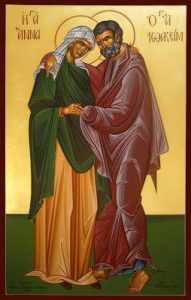 The conception of the all-holy virgin Mary in the womb of Anna is celebrated on December 9 in the Byzantine tradition, for a natural reason, that the Eastern ancients thought a girl was in the womb one day less than a boy. However, in the Ruthenian Church in America, the feast is now celebrated together with the Roman Church on December 8, nine months before her birth on September 8, because she is the patron of the United States.
The conception of the all-holy virgin Mary in the womb of Anna is celebrated on December 9 in the Byzantine tradition, for a natural reason, that the Eastern ancients thought a girl was in the womb one day less than a boy. However, in the Ruthenian Church in America, the feast is now celebrated together with the Roman Church on December 8, nine months before her birth on September 8, because she is the patron of the United States.
It is clear that this is a preparation for the birth of Christ on Christmas, for the first sticheron of the feast begins: “The barren Anna leaped for joy when she gave birth to Mary the Virgin who in turn will give birth in the flesh to God the Word.” Mary, the daughter of Anna and Joachim by way of natural birth is to be the temple of the Word of God incarnate for our sake and for our salvation.
The Eastern and Western Churches put the accent on different aspects of the feast. In the East, we celebrate the miracle of God taking away the barrenness of Anna’s womb. The Protoevangelium of James portrays the sadness of Joachim and Anna. Joachim lamented, “I have searched whether I am the only one who has not begotten offspring in Israel, and I have found of all the righteous that they had raised up offspring in Israel.” Anna wept, “I will bewail my widowhood, and bewail my childlessness.” (1,3 and 2,1) Two angels came, one to Joachim and another to Anna with a divine message that they would bear a child, even in their old age. When God takes away an emptiness, he fills us more than our faith can grasp, and they gave birth not only a child, but to the new Ark of God’s covenant with us.
The Western Church, on the other hand, puts the accent on Mary’s purity from all sin from her conception, defined by Pope Bl. Pius IX in 1848 as the Immaculate Conception. The theology behind this is that the incarnation of the sinless Word of God must come from a sinless temple, the womb of Mary which was never touched by sin, even from her conception.
It is unfortunate that this dogma has become a bone of contention between the Catholic and Orthodox Churches. Both believe in the ancestral sin, but in different ways, so that for the Orthodox the main curse of the sin of Adam and Eve is death, while for the Catholics, it is original sin. May we seek unity and not division. Most Orthodox theologians do believe that the “ancestral sin” has infected the human race, but might disagree about the way it does this. In our dialogue, we must seek a mutual understanding, perhaps in the words of Orthodox theologians who saw a “pre-purification” in Mary. “And in every way [the Lord] became a man, save sin, for he had been conceived from a virgin, after she had been pre-purified with respect to soul and body through the Holy Spirit.” (Gregory the Theologian, Homily 38 on the Theophany) or St. John Damascene, who wrote, “O all-blessed loins of Joachim, from which the all-pure seed was sown. O epic womb, in which the all-holy infant was born, after she was formed, and a little later increased by nutriments from Anne. Her (Anne’s) belly conceived in itself an ensouled heaven, wider than the wide space of heaven.” (Both quotes from Christian Kappes’ book, The Immaculate Conception 21 and 60).
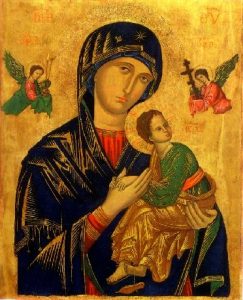 During the month of May our Ukrainian Greek Catholic Church honors the Mary the Mother of God in special prayer services as the akathist and moleben services. Mary was the humble servant of the Lord Who was always one with Her Son, our Lord God and Savior, Jesus Christ.
During the month of May our Ukrainian Greek Catholic Church honors the Mary the Mother of God in special prayer services as the akathist and moleben services. Mary was the humble servant of the Lord Who was always one with Her Son, our Lord God and Savior, Jesus Christ.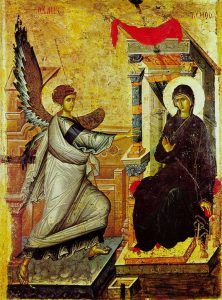 Today is Palm Sunday; it is also the solemn feast of the Annunciation to Mary by the Archangel Gabriel. We celebrate both on the same day.
Today is Palm Sunday; it is also the solemn feast of the Annunciation to Mary by the Archangel Gabriel. We celebrate both on the same day.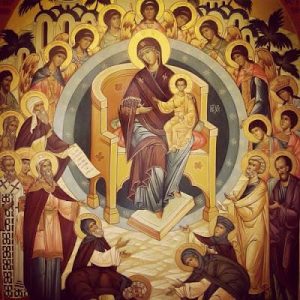 Many Byzantine feasts have a commemoration on the day after a great feast called a “synaxis,” that is, an “assembly” or “gathering” in honor of one who participated in the feast. No more honorable person could ever be found than the holy Lady, the Mother of God.
Many Byzantine feasts have a commemoration on the day after a great feast called a “synaxis,” that is, an “assembly” or “gathering” in honor of one who participated in the feast. No more honorable person could ever be found than the holy Lady, the Mother of God. The conception of the all-holy virgin Mary in the womb of Anna is celebrated on December 9 in the Byzantine tradition, for a natural reason, that the Eastern ancients thought a girl was in the womb one day less than a boy. However, in the Ruthenian Church in America, the feast is now celebrated together with the Roman Church on December 8, nine months before her birth on September 8, because she is the patron of the United States.
The conception of the all-holy virgin Mary in the womb of Anna is celebrated on December 9 in the Byzantine tradition, for a natural reason, that the Eastern ancients thought a girl was in the womb one day less than a boy. However, in the Ruthenian Church in America, the feast is now celebrated together with the Roman Church on December 8, nine months before her birth on September 8, because she is the patron of the United States.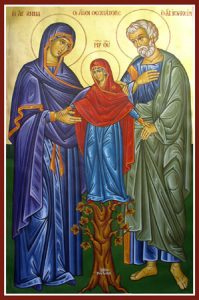 December 8 is a Holy Day celebrating the Maternity of Saint Ann (AKA Immaculate Conception of Mary, the Mother of God in the Latin Church). You will also hear the feast as the Conception of the Blessed Virgin Mary.
December 8 is a Holy Day celebrating the Maternity of Saint Ann (AKA Immaculate Conception of Mary, the Mother of God in the Latin Church). You will also hear the feast as the Conception of the Blessed Virgin Mary.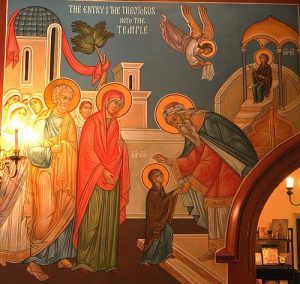 The feast today is the story of our salvation through the temple of God.
The feast today is the story of our salvation through the temple of God.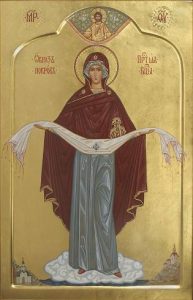 On this Sunday, we celebrate the feast of the Protection of the Theotokos. This commemorates the vision of St. Andrew, the Fool for Christ, who, during an attack, as the people kept an All-night Vigil of Prayer, saw the Mother of God holding a protecting veil over her city. We can say, then, that this feast celebrates the power of Mary, who fights on behalf of Christians, and is a mighty protector of the people. On this day we read the common Gospel from St. Luke on feasts of Mary, the story of Mary and Martha. Maybe a better gospel would be the story of the wedding at Cana in Galilee. There, at Cana, it was Jesus’ mother, a woman, who by her plea, guided God to make wine out of water, telling the stewards, and through them, saying to all of us, “Do whatever he tells you.” As his mother, she began the story of Jesus’ mission, even though he had said, “My hour has not yet come.” This truly is power given to her by God. This is still Mary’s relationship with us. She is our protector and motherly intercessor. She is the mother of all believers, for our Lord, on the cross, gave her to his beloved disciple and through him to all of us. Her message to us always, every time she appears, is “Do what my Son tells you.”
On this Sunday, we celebrate the feast of the Protection of the Theotokos. This commemorates the vision of St. Andrew, the Fool for Christ, who, during an attack, as the people kept an All-night Vigil of Prayer, saw the Mother of God holding a protecting veil over her city. We can say, then, that this feast celebrates the power of Mary, who fights on behalf of Christians, and is a mighty protector of the people. On this day we read the common Gospel from St. Luke on feasts of Mary, the story of Mary and Martha. Maybe a better gospel would be the story of the wedding at Cana in Galilee. There, at Cana, it was Jesus’ mother, a woman, who by her plea, guided God to make wine out of water, telling the stewards, and through them, saying to all of us, “Do whatever he tells you.” As his mother, she began the story of Jesus’ mission, even though he had said, “My hour has not yet come.” This truly is power given to her by God. This is still Mary’s relationship with us. She is our protector and motherly intercessor. She is the mother of all believers, for our Lord, on the cross, gave her to his beloved disciple and through him to all of us. Her message to us always, every time she appears, is “Do what my Son tells you.”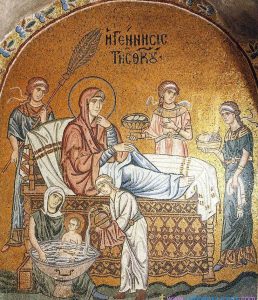 Christians of East and West can express their gratitude for today’s feast to brought to our awareness by Eastern monks. It was in the seventh century, this feast of Our Lady was celebrated by Greek Christians. The narrative of Mary’s Nativity is not testified to in sacred Scripture but known only from apocryphal sources. By the end of the seventh century this feast gained acceptance in the Diocese of Rome.
Christians of East and West can express their gratitude for today’s feast to brought to our awareness by Eastern monks. It was in the seventh century, this feast of Our Lady was celebrated by Greek Christians. The narrative of Mary’s Nativity is not testified to in sacred Scripture but known only from apocryphal sources. By the end of the seventh century this feast gained acceptance in the Diocese of Rome.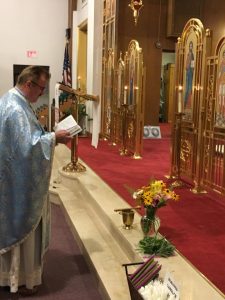 Tonight at the Divine Liturgy, Father Iura blessed herbs and flowers.
Tonight at the Divine Liturgy, Father Iura blessed herbs and flowers.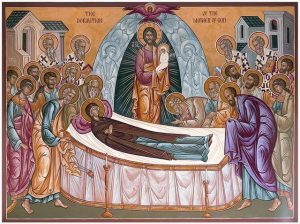 “Come, all you ends of the earth, let us praise the blessed passing of the Mother of God. She delivers her sinless soul into the hands of her Son; through her holy Dormition, the world is given new life.” (Stichera at the Litija)
“Come, all you ends of the earth, let us praise the blessed passing of the Mother of God. She delivers her sinless soul into the hands of her Son; through her holy Dormition, the world is given new life.” (Stichera at the Litija)